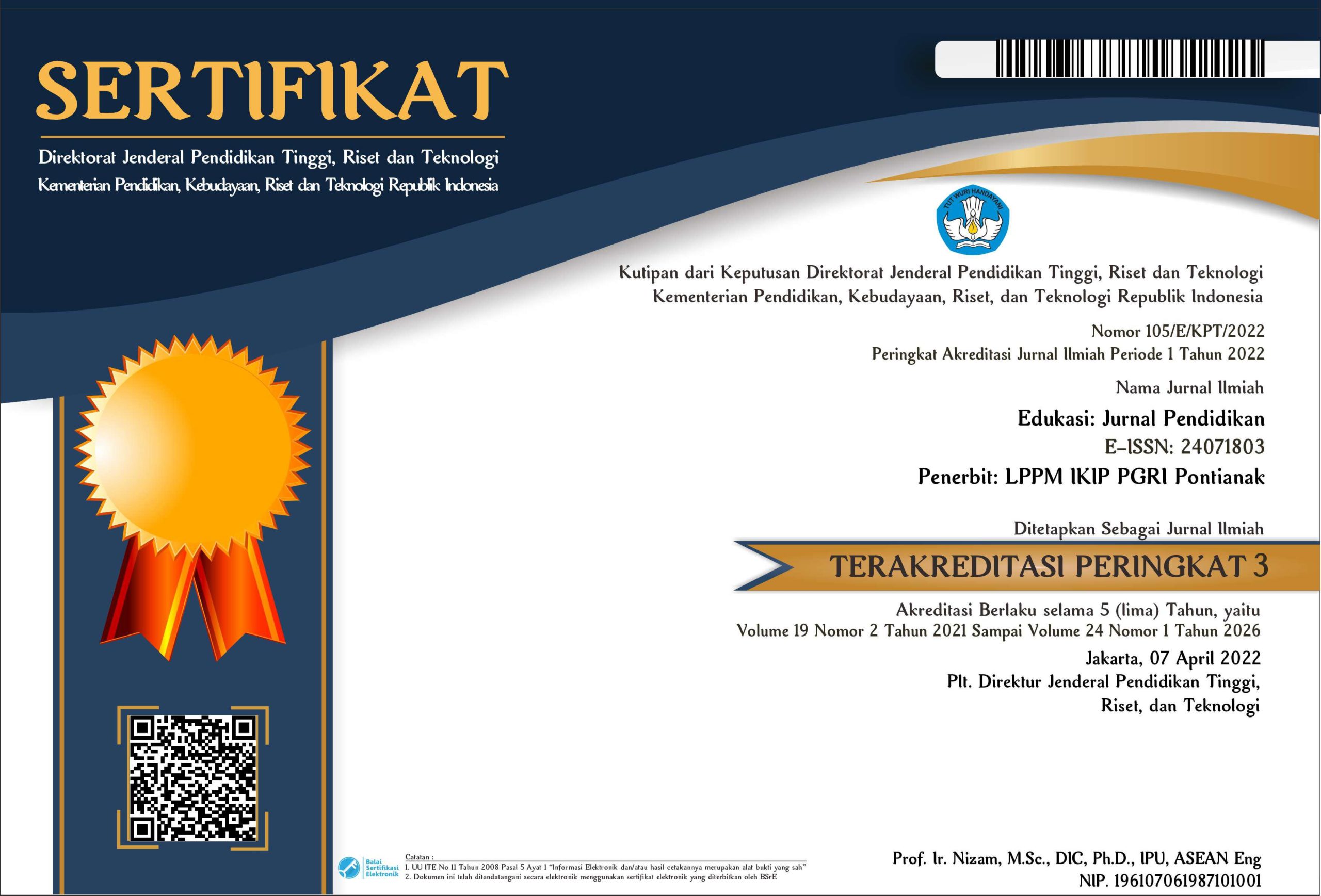Validitas Strategi Scaffolding IMWR (Inspiring-Modeling-Writing-Reporting) pada Pendekatan Saintifik
DOI:
https://doi.org/10.31571/edukasi.v18i1.1714Keywords:
strategi scaffolding, inspiring-modeling-writing-reporting (IMWR), pendekatan saintifik, scaffolding strategy, scientific approachAbstract
Abstrak
Pendekatan saintifik merupakan salah satu pendekatan yang disarankan dalam Kurikulum 2013. Tujuan penelitian adalah untuk menguji validitas dan reliabilitas strategi scaffolding pada pendekatan saintifik. Metode penelitian adalah deskriptif melalui focus group discussion (FGD). FGD dilakukan dalam rangka memvalidasi strategi scaffolding oleh 3 orang pakar pendidikan (dengan kualifikasi minimal doktor) untuk membahas, memberi masukan, dan memberi penilaian terhadap strategi scaffolding IMWR yang dikembangkan. Proses penilaian menggunakan instrumen validasi. Analisis data menggunakan analisis deskriptif dengan cara menghitung skor dari validator untuk mengetahui validitas dan reliabilitas strategi scaffolding. Hasil penelitian menunjukkan bahwa strategi scaffolding IMWR sangat valid (dengan skor 3,79) dan reliabel (dengan skor 0,93) sehingga dapat digunakan untuk membantu menerapkan pendekatan saintifik dalam pembelajaran.Â
Â
Abstract
The scientific approach is one of the approaches suggested in the 2013 Curriculum. The purpose of the research was to test the validity and reliability of scaffolding strategies in the scientific approach. The research method is descriptive through focus group discussions (FGD). The FGD was conducted in order to validate the scaffolding strategy by 3 education experts (with a minimum doctoral qualification) to discuss, provide input, and provide an assessment of the IMWR scaffolding strategy developed. The assessment process used a validation instrument. Data analysis used descriptive analysis by calculating the score of the validator to determine the validity and reliability of the scaffolding strategy. The results showed that the IMWR scaffolding strategy was very valid (with a score of 3.79) and reliable (with a score of 0.93) so that it could be used to help apply a scientific approach to learning.
Â
Â
Downloads
References
Anjarsari, E. 2019. Faktor Permasalahan Pendekatan Saintifik 5M dalam Pembelajaran Matematika di SMA (The Problem Factor of the 5M Scientific Approch in Learning Mathematics in High School). Jurnal Pendidikan Matematika dan Matematika, I(1): 12-20.
Arends, R. I. 2012. Learning to Teach; 9th edition. New York: Mc. Graw-Hill Companies, Inc.
Aryani, M. F. 2014. Studi Kasus Penerapan Pendekatan Saintifik pada Guru-Guru di SMA N 1 Bawang (Studi pada Tahun Ajaran 2013/2014). Economic Education Analysis Journal, 3(3): 558-563.
Borich, G. 1994. Observation Skill for Effective Teaching. New York: Mac Millan Publishing Company.
Darnius, S. 2016. Identifikasi Kesulitan Guru dalam Mengimplementasikan Kurikulum 2013 dengan Pendekatan Saintifik di Kelas Tinggi Gugus Mangga Kecamatan Jaya Baru Banda Aceh. Jurnal Pesona Dasar, 2(4): 40-48.
Fussalam, Y. E. & Elmiati. 2018. Implementasi Kurikulum 2013 (K13) SMP Negeri 2 Sarolangun. Jurnal Muara Pendidikan, 3(1): 45-55.
Hidayah, H., Widiati, U., & Irawan, E. B. 2015. Pendekatan Saintifik dalam Implementasi Pembelajaran Tematik Kelas II SD. Malang: Pascasarjana Universitas Negeri Malang. Tesis tidak diterbitkan.
Hmelo-Silver, C. E., Duncan, R. G., & Chinn, C. A. 2007. Scaffolding and Achievement in Problem-Based and Inquiry Learning: A Response to Kirschner, Sweller, and Clark (2006). Educational Psychologist, 42(2): 99-107.
Hofstein, A. 2012. Teachers’ Professional Development for Inquiry-Based Learning. Tbilisi: Ilia State University Georgia.
Joyce, B. & Weil, M. 2003. Models of Teaching (5th Edition): Pearson Education Inc.
Kirschner, P. A., Sweller, J., & Clark, R. R. 2006. Why Minimal Guidance During Instruction Does Not Work: An Analysis of the Failure of Constructivist, Discovery, Problem-Based, Experiential, and Inquiry-Based Teaching. Educational Psychologist, 41(2): 75-86.
Krissandi, A. D. S. & Rusmawan. 2015. Kendala Guru Sekolah Dasar dalam Implementasi Kurikulum 2013. Cakrawala Pendidikan, 34(3): 457-467.
Krueger, R. A. & Casey, M. A. 2000. Focus Groups: A Practical Guide for Applied Research (Third Edition). Thousand Oaks, CA: Sage.
Kuhn, D., Black, J., Keselman, A., & Kaplan, D. 2000. The Development of Cognitive Skills to Support Inquiry Learning. Cognition and Instruction, 18(4): 495-523.
Kusumaningsih, C. & Azman. 2018. Penerapan Pendekatan Scaffolding dalam Meningkatkan Keterampilan Berbicara. Jurnal Pendidikan Bahasa, 7(2): 294-307.
Lupi, N. Z. W. 2017. Problematika Penerapan Kurikulum 2013 pada Lembaga Pendidikan Anak Usia Dini di Kecamatan Bululawang. Jurnal PG-PAUD Trunojoyo, 4(1): 31-38.
Maisyaroh, Zulkarnain, W., Setyowati, A. J., & Mahanal, S. 2014. Masalah Guru dalam Implementasi Kurikulum 2013 dan Kerangka Model Supervisi Pengajaran. Manajemen Pendidikan, 24(3): 213-220.
McNeill, K. L., Lizotte, D. J., Krajcik, J., & Marx, R. W. 2006. Supporting Students’ Construction of Scientific Explanations by Fading Scaffolds in Instructional Materials. The Journal of the Learning Sciences, 15(2): 153-191.
Miao, Y., Engler, J., Giemza, A., Weinbrenner, S., & Hoppe, U. 2012. Develoment of a Process-Oriented Scaffolding Agent in an Open-Ended Inquiry Learning Environment. Research and Practice in Technology Enhanced Learning, 7(2): 105-128.
Miska, A. 2004. Classroom Modeling: Scaffolding Learning or Stifling? An Inquiry dalam https://www.ed.psu.edu/englishpds/inquiry/projects/ miska04.htm. Diakses 12 Maret 2015.
Muliatina. 2016. Kendala Guru dalam Menerapkan Pendekatan Saintifik pada Kurikulum 2013 di SDN Teupin Pukat Meureudu Pidie Jaya. Jurnal Ilmiah Mahasiswa Prodi PGSD FKIP Unsyiah, 1(1): 129-136.
Nieveen, N., McKenney, S., & Akker, V. 2007. Educational Design Research. New York : Routledge.
Ningsih, H. S., Koryati, D., & Deskoni. 2016. Analisis Kesulitan Guru dalam Menerapkan Pembelajaran Saintifik pada Mata Pelajaran IPS di SMP Negeri Kota Palembang. Jurnal Profit, 3(2): 130-138.
Oktadiana, R., Amrazi, & Rustiyarso. 2016. Kesulitan Guru dalam Penerapan Pendekatan Saintifik Kurikulum 2013 Kasus pada Guru Sosiologi di SMA. Jurnal Pendidikan dan Pembelajaran Khatulistiwa, 5(10): 1-12.
Qondias, D., Kaka, P. W., & Nau, M. I. 2018. Studi Evaluasi Kurikulum 2013 Tingkat Sekolah Dasar di Wilayah Timur Indonesia. Jurnal Pendidikan Dasar PerKhasa, 4(1): 63-72.
Quintana, C. & Barry J. F. 2006. Supporting Science Learning and Teaching with Software-Based Scaffolding. Michigan: Michigan Center for Highly Interactive Computing, Curricula, and Classrooms in Education School.
Rahmawati, A. N. 2018. Identifikasi Masalah yang Dihadapi Guru dalam Penerapan Kurikulum 2013 Revisi di SD. Indonesian Journal of Primary Education, 2(1):115-123.
Ratumanan, T. G. & Laurens, T. 2011. Evaluasi Hasil Belajar. Surabaya: Unesa University Press.
Rostika, D. & Prihantini. 2019. Pemahaman Guru tentang Pendekatan Saintifik dan Implikasinya dalam Penerapan Pembelajaran di Sekolah Dasar. EduHumaniora: Jurnal Pendidikan Dasar, 11(1): 86-94.
Ruja, I. N. & Sukamto. 2015. Survey Permasalahan Implementasi Kurikulum Nasional 2013 Mata Pelajaran Ilmu Pengetahuan Sosial Sekolah Menengah Pertama di Jawa Timur. Sejarah dan Budaya, 9(2): 193-199.
Slavin, R. E. 2006. Educational Psycology: Theory and Practice. New Jersey: Pearson Educations Inc.
Tryanasari, D. & Riyanto, E. 2014. Analisis Keterlaksanaan Implementasi Kurikulum 2013 di Kelas 4 SD Se-Kabupaten Magetan. Jurnal LPPM, 2(1): 52-61.
Wakhidah, N. 2018. Pembelajaran dengan Pendekatan Saintifik terhadap Kemampuan Berpikir Kritis Mahasiswa Calon Guru Madrasah Ibtidaiyah. Premiere Educandum: Jurnal Pendidikan Dasar dan Pembelajaran, 8(2): 150-160.
Wakhidah, N. 2017a. Scaffolding Pendekatan Saintifik. Surabaya: Jaudar Press.
Wakhidah, N. 2017b. Improving Learning Outcomes of Ecological Concept using Scaffolding Strategy on Scientific Approach. International Journal of Education, 9(1): 19-29.
Wakhidah, N. 2016. Strategi Scaffolding Inspiring-Modeling-Writing-Reporting (IMWR) dalam Menerapkan Pendekatan Saintifik untuk Meningkatkan Keterampilan Proses Sains dan Penguasaan Konsep. Surabaya: Universitas Negeri Surabaya. Disertasi tidak diterbitkan.
Wakhidah, N. 2014. Implementation Model 5M in Scientific Approach on Student Candidate Master. Surabaya: Preliminary Report of Research.
William, B. 2012. Evaluating the Efficacy of Focus Group Discussion (FGD) in Qualitative Social Research. International Journal of Business and Social Science, 3(7): 54-57.
Downloads
Published
How to Cite
Issue
Section
License
Authors who publish in this journal agree to the following terms:
- Authors retain copyright and grant the journal the right of first publication with the work simultaneously licensed under a Creative Commons Attribution License (CC-BY-NC) that allows others to share the work with an acknowledgment of the work's authorship and initial publication in this journal.
- Authors are able to enter into separate, additional contractual arrangements for the non-exclusive distribution of the journal's published version of the work (e.g., post it to an institutional repository or publish it in a book), with an acknowledgment of its initial publication in this journal.
- Authors are permitted and encouraged to post their work online (e.g., in institutional repositories or on their website) prior to and during the submission process, as it can lead to productive exchanges, as well as earlier and greater citation of published work.















